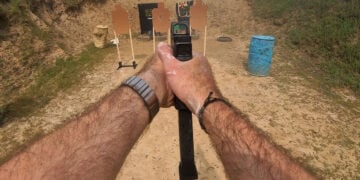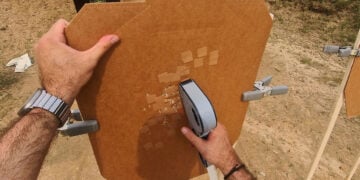In my almost 40 years as a police officer, 30 as a firearms instructor, one of the most satisfying assignments I have had is teaching our Civilian Firearms Training Class. It is a basic handgun class with the goal to educate the uneducated. In the class, we discuss state law concerning self-defense and carry outside the home, basic marksmanship, situational awareness, handgun nomenclature, and maintenance. It is a very basic class designed for the newcomer to shooting and guns.
One thing I have witnessed, lo these many years, is that only a small percentage of my students will ever make their way back to the range. I have crossed paths with many former students. When I ask how their shooting skills have progressed many have the same answer, “Yeah, I really need to get out to the range.”
If one’s desire is to be a plinker, by which I mean someone who occasionally goes to the range to pop off a few rounds for enjoyment and relaxation, then safety is the main concern. However, if a person wants to carry a gun for the protection of self or others then you are going to have to do what I call an “honest assessment” about yourself. That requires asking yourself some serious questions and determining by your bluntly honest answers whether or not you should be a “gun toter.”
The first question one has to consider is:
“Can I point a gun at another human being and pull the trigger?”
Many people will thump their chest and emphatically state they have no problem dropping a bad guy. Is that really true? Let me offer a couple of examples.
Several years ago a woman came through my class. From the outset, she did not appear to be comfortable talking about guns in general and using one to defend herself in particular. So comes range day. I had the class line up on the firing line, got them all loaded and ready to shoot. I gave the command to fire. She fired one round and had an emotional breakdown. Sobbing, shoulders heaving, and flailing her gun around. Needless to say, it was a tense few seconds as I tried to get control of her and the gun in her hand.
Once she was relatively calm I had the class take a break so she and I could talk. She would not talk about why shooting the gun had that effect on her. Perhaps she had been involved in an unfortunate incident with a gun previously in life. She may be such a humanitarian that the thought of harming another person is revolting to her. Whatever the reason is it does make her weak or wrong. She is just not someone who is wired to be a shooter.
The other person was a friend of mine, a real shooting guy. He had numerous guns, reloaded his own bullets, practiced regularly, and was always armed. One day he walked in on an armed robbery at a pawn shop. A shootout ensued with both he and the bad guy being wounded. I visited him in the hospital. He told me that as he was drawing his gun the thought going through his head was, “Am I really going to shoot this guy?” That bit of hesitation gave the bad guy a chance to see him and turn his weapon on my friend. This was a guy who had practiced hitting the target for years yet he had not completely prepared for the day he would shoot another person and it nearly cost him his life.
So before you strap on a gun and go out to be a sheepdog you must spend some serious time getting your mind prepared to do what you may have to do someday. I am not even going to discuss the aftermath of taking a life even if it is justified. There will be a police investigation, possible grand jury review, and civil court ramifications. That is for another discussion.
The next question in our honest assessment is about time. Everyone is busy these days. If you want to carry a gun ask yourself this:
“Am I willing to put in the time it takes to be competent and confident carrying a gun?”
Joe Montana and Jerry Rice did not just walk out on the field one day and become the greatest passing duo in NFL history. They spent long hours on the practice field honing their physical talents. They also spent time watching film, discussing game plans, and passing routes.
Occasional range practice will not be enough to make you competent in a lethal encounter. Range practice every day may be a little unrealistic. Getting to the range consistently just takes some commitment and planning. A little research will lead you to some good training plans that will help you hone real-world skills. Many can be completed in less than a lunch hour.
Once you have reached a respectable level of confidence in marksmanship use your time to prepare for the real thing. A lethal confrontation will be a fluid environment. So your practice needs to reflect that. This is the time to try shooting on the move, shooting from different positions; crouching, kneeling, from behind cover, one-handed both strong and weak. Get your heart rate up with some jumping jacks or pushups. If your athletic days are over take a brisk walk around the range before you shoot. This will simulate the stress of shooting in a lethal confrontation.
So you have determined that you can use a firearm for self-defense. You have practiced to a level that you are a pretty decent shot even under stress. What should you think about now?
Don’t Get Cheap Essentials
The third honest assessment you need to do is about money. Maybe this should be the first one, but I would hate for you to spend a lot of money and find out you cannot fulfill the other two.
I have a friend that was a coordinator at our local state academy at which I was an adjunct instructor. She and I worked together for over 20 years. She was a great instructor but firearms were not her specialty.
I got a phone call from her a while back asking about equipment. She was calling for her brother. He had just purchased a handgun, gotten his carry license, and needed an opinion about a holster he was going to purchase for concealed carry.
She gave me the web link to look at. The holster was a generic one size fits all canvas holster with a thin Velcro strap. The big selling point was that it was only $15. I know that like practice time discretionary funds are limited also. So you may not be able to buy the custom gun and top-of-the-line accessories such as a magazine pouch or heavy-duty belt but you need to do an honest assessment of your finances to get the best you can afford.
A one size fits all holster will not fit any handgun well. It will not be long before your gun is falling out and bouncing across the floor. Holsters specifically made for a particular handgun can be had for a relatively low cost. If you are serious about self-defense you are going to spend several hundred dollars to get a reliable handgun that you are confident is going perform when needed. So you should want to have a carry system that is going to protect your investment.
Well, there it is, my suggestions to consider if you are really thinking about becoming a licensed gun carrier. I hope I have not dissuaded anyone from taking on this responsibility. I also hope that some may take this information and become a sheepdog. It takes a little work but I have never wanted to depend on others for my safety and that of my loved ones. I think many who read this feel the same as I do. Be safe and watch your six.









